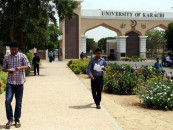Complying with SC orders: Sindh police to get geo-fencing facility
CJP Anwar Zaheer Jamali deplored mistrust between the federal and provincial authorities

PHOTO: FILE
During the last hearing in the Karachi suo motu law and order case, a five-judge bench headed by Chief Justice of Pakistan Anwar Zaheer Jamali, deplored mistrust between the federal and provincial authorities in taking effective measures to contain violence in Karachi. The attorney general had assured the apex court that in order to address the grievances of law-enforcement agencies in Sindh regarding geo-fencing and Global Positioning System locators, a high-level meeting would be arranged to amicably decide these matters and other ancillary issues between the federal and provincial governments and agencies.
Sindh Police to hire 20,000 army-trained cops
Authorities at the centre and in Sindh agreed to evolve a new set of standard operating procedures commonly called SoPs so that “greater coordination” could be ensured for taking action against terrorists and elements involved in organised crime. The meeting took stock of the Sindh police’s complaints vis-à-vis non-cooperation of federal departments on different issues.
A senior official, who attended the meeting, told The Express Tribune that the main objective of the meeting was to give a viable working plan to the departments at the centre and in Sindh to launch a crackdown on terrorists.
Published in The Express Tribune, August 10th, 2016.



















COMMENTS
Comments are moderated and generally will be posted if they are on-topic and not abusive.
For more information, please see our Comments FAQ